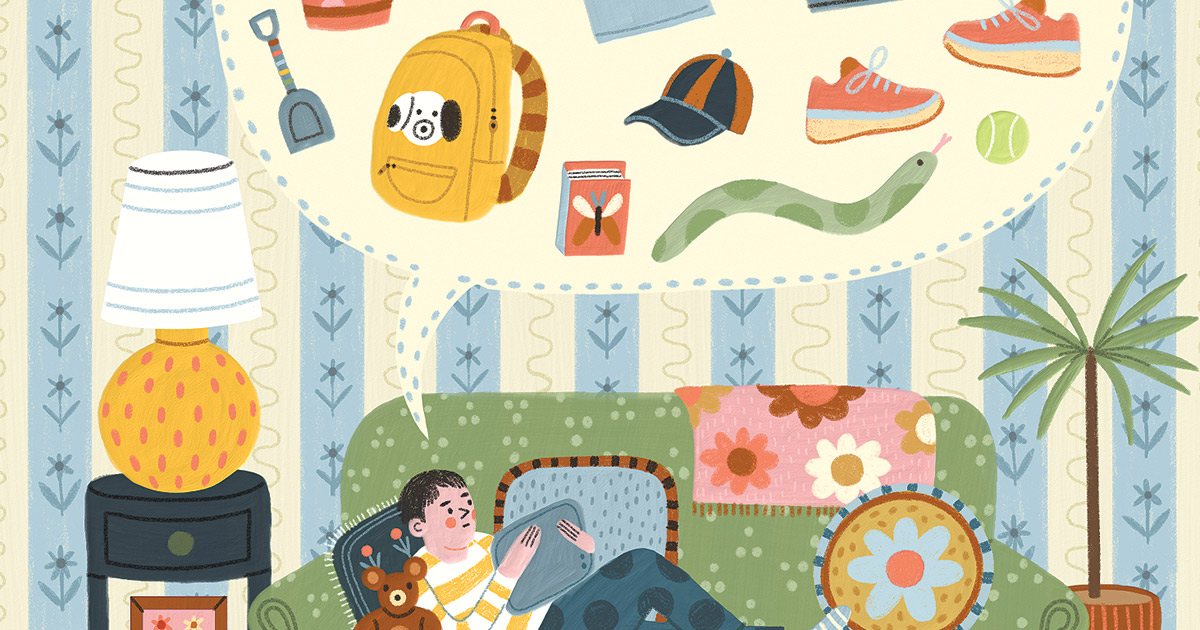World
If Patience Is a Virtue, What Is Our On-Demand World Teaching Our Children?

Life has not yet taught my children why waiting matters. I’m not sure it’s ever going to.
Can children learn patience in this culture of now? / Illustration by Molly Egan
“Mom, can we look at backpacks, like you said?”
It was the Fourth of July. Three weeks into summer break and eight weeks before fifth grade would start, and my 10-year-old, Luke, was fairly vibrating with the need to browse schoolbags. This was my doing, I guess: I had casually remarked 48 hours prior that come fall, he’d need a new one. Since then, he’d asked me four times when we were going to get after that already.
I was annoyed, but I also understood it, because my son knows the drill — once we browse, we will find; once we find, we will click; once we click, we will get the thing we want, delivered right to the door, sometimes within hours. It’s very satisfying. And yes, sure, simply getting something new is part of the appeal for him here — he’s an American, after all, raised on the creed of consumerism like the rest of us. But beyond that, there’s also just the speed of it, the genie-like way something can suddenly pop into your brain, and then — *poof* — it can be yours. Why on earth would you wait for something you want when you don’t have to?
Luke and his little sister, Ellie, who’s six, have never really had to. They were born into the Peak Convenience epoch, a world of Amazon and Google and Apple Music and Alexa and high-speed internet and Netflix — and not the DVD-by-snail-mail Netflix, but the immediate, ever-present, on-demand version, plus Apple TV, Prime, Disney Plus, and Comcast DVRing. Want to watch Bluey now? Which episode, honey? Which part of which episode? Want to watch it five times in a row? Maybe 10? Oh, a book? Go look for what you want on Epic. Or download it right from the library!
It’s no wonder they’re so bad at waiting for things, obsessed with instant gratification and anesthetized to so much of life’s tedium and periods of dullness that happen between the action bits.
To be fair, they’re not the only ones.
Once upon a time, much of my generation sat in the back of our parents’ cars, sans screens, and roved what felt like the whole earth on the most banal errands, things that had nothing to do with us or our entertainment. We counted ceiling tiles inside the mattress store; we pretended to be lost in the circle racks at JCPenney while our moms shopped; we made up little dances standing in the deposit line at the bank. It sucked, all this waiting around for grown-ups to do things, but we didn’t know any different.
Now we do. Ours is a world in which nearly all of that feels wildly outdated, if not outright obsolete. For the most part, I’d say, we’ve really let our waiting muscles atrophy. But at least we have these muscles. Given how many chores we’ve eradicated and waiting-around times we’ve eliminated, I’m not sure my kids will ever develop them. This concerns me, because what sort of undisciplined, entitled, thrill-less existence might be ahead for them if they don’t learn the art and the skill of forbearance? Of cooling your jets, biding your time, keeping your powder dry?
And so no, I told my boy: “You’ll just have to wait on the backpack.” But hey, I added, isn’t it so nice to have something to look forward to as the school year gets closer?
“I … guess,” he said, moodily. Dubiously.
•
The Quakers, our peace-loving Philadelphia ancestors, were patient people; you had to wait and wait and wait, you see — in silence, in fixedness, as a spiritual priority — for the still, small voice. Ben Franklin liked patience too, or, at the very least, recommended it: “He who can have patience can have what he will.”
Before Ben’s advocacy, there was William Langland, the English poet whose sentiment about patience being a virtue burrowed its way deep into our collective consciousness. The Bible talks about the value and importance of waiting. It also comes up with the Buddhists, the Muslims, the Stoics, the Jews. Confucius, too.
Prefer psychology over philosophy? We’ve come to understand that the synapses firing while we wait shape everything from our outlook on life to our empathy levels to our self-control to our emotional preparedness for whatever comes next. And physiologically? Impatience causes stress, which hurts your immune system, raises blood pressure, and irritates your stomach.
As this world spins faster and faster toward its seemingly inevitable and impending combustion, I think, aren’t my children actually going to need more self-discipline, more mettle, more appreciation for the significance of things, rather than less?”
But it’s hard to impart all the wisdom and learning of the ages to a child, especially in a world geared toward the opposite — and especially inside the Lego store at the mall. This was the case for my friend Beth, whose nine-year-old daughter Nessa had a pocketful of her own hard-earned money and a hankering for a new Lego set. Once inside the store, Beth realized that the set Nessa wanted could be ordered and delivered — reasonably quickly — from a competitor for much less money, and so she set about trying to persuade her daughter to hold off on buying. “Online, it was like half the price!” she says. “Just two days more, and she’d have what she wanted, plus more money to spend on something else!”
This was, Beth realized, pretty similar to the famous marshmallow test from a handful of decades back. Remember that? In trying to understand how and when children develop an understanding of delayed gratification, some researchers at Stanford offered a choice to a bunch of four- and five-year-olds: They could eat one marshmallow immediately or get two marshmallows if they could hold off on scarfing the first one for 15 minutes or so.
Nessa … well, let’s just say she didn’t land voluntarily on the delayed gratification end of the scale. For what it’s worth, I tell Beth, I’m pretty sure at least one of my children would have similarly failed this test. And then, they’d likely just move on to wanting the next thing even more quickly. That’s how instant gratification tends to work: emphasis on the instant, not the gratification.
I consider this in moments of parental reflection — typically as I’m trying to drift off at night. As this world spins faster and faster toward its seemingly inevitable and impending combustion, I think, aren’t my children actually going to need more self-discipline, more mettle, more appreciation for the significance of things, rather than less?
The clock ticks on; my brain revs into hyperbole gear, pulling up images of various post-combustion scenarios and my children trying to survive whatever hellscape remains. I wonder: Will something like, say, their absolute inability to wait for a meal without incessant foraging for snacks be the thing that does them in?
•
Not that I am a paragon of patience. I am not, and in the light of day, this is what nags at me the most. My children hear me talk about being patient all the time, but do they also see how bad I am at this, how much I’ve given myself over to the allure of now?
It shames me to tell you how irrationally annoyed I am when I can’t fast-forward through a show’s opening credits, or when the Uber is going to take more than 10 — fine, more than five — minutes to come and ferry me (so conveniently!) to wherever I’m going. I once read an interview with Lin-Manuel Miranda in which he said something to the effect of how creativity is born in times of boredom and nothingness. I’m a writer! And yet I rarely so much as stand in line for coffee without distracting myself with my phone. (Screw you, boredom and nothingness!) I’ve also read about the prevalence in our society of so-called “hurry sickness,” which is basically psychologist-speak for the way I forgo reheating the leftovers for lunch so I can just be done eating faster; how I smolder waiting for the teenage clerk at CVS to come open the goddamned locked deodorant case. Occasionally, in rare moments of mindfulness, I become aware of a mild but constant sense of urgency thrumming in the background, even at times that are in no way urgent — like shopping for deodorant at CVS.
I don’t wish any of this for my kids. I want them to be patient. I want them to be creative. I want them to be able to resist the pull of the cultural tide to which I sometimes feel I have succumbed. Because, as we’ve been told and told and told — and as I can attest — entitled impatience doesn’t make for a nicer life. Or a nicer me, however well I try to hide it.
Do my children see this?
•
Someone who is much better at waiting than I am is my friend and neighbor Viola, whom I think of as the opposite of entitled impatience. She’s East German by birth and lived her first decade of life before the Berlin Wall came down. Back then, she explains, you waited for the chance to buy a car — your parents put your name on a list when you were born; if things went according to plan, you’d get your turn by age 18 or so. You waited to make phone calls on the pay phone outside your apartment building. If you had more children, you waited for a bigger apartment. When you saw a line, she says, you simply got in it: If people were waiting for something, it must be worth waiting for. You carried a bag everywhere, just in case. There was no point in complaining, begging, cajoling, toe-tapping, smoldering while you waited. Such was life.
We can impose on our children all the waiting periods and lectures about patience we want, but every generation is going to learn its own different lessons. Or maybe some of the same ones, but in different ways.”
Obviously and in so many ways, this was a life very different from the one she lives today. But I still don’t know her to complain or toe-tap or smolder, at least not in waiting. She has grit. She also doesn’t rush through much of anything — despite having three kids and what appears to me to be a high-pressure job — but tends to stay and really soak things in, rarely getting antsy, as I do, to move on to the next thing.
Surely these traits, this particular strand of stamina, can be attributed to her formative years, right?
Well … maybe, Viola allows. Or maybe not. To be honest, she tells me, she doesn’t even see that this is a particularly relevant question, at least not as I’m asking it, as it relates to raising our own children today. She can’t replicate her old world of scarcity any more than any of us can re-create the conditions of yesterday. (Queueing up every Saturday in the deposit line at the bank isn’t coming back, is it?) We can impose on our children all the waiting periods and lectures about patience we want, but I think what she’s getting at is that every generation is going to learn its own different lessons. Or maybe some of the same ones, but in different ways.
A more relevant point, perhaps, is another one she makes, with a nod to Socrates: We all seem to think that kids today enjoy too many modern luxuries; every generation thinks the next one is going to the dogs. But they never really do. So far, anyway.
And still more relevant, maybe: One of the reasons that old marshmallow test became so famous was because the researchers showed a correlation between waiting skills and success; the kids who were the best waiters had the fewest behavioral problems and the highest SAT scores.
A certain segment of the world took this very seriously. (Too seriously, some of the researchers have since implied: “The idea that your child is doomed if she chooses not to wait for her marshmallows is really a serious misinterpretation,” one of them told PBS’s News Hour in 2015.) School curricula were designed to teach delayed gratification. There were talks and research and New York Times columns and many books written about how character traits like grit and patience might translate into educational and life success. And they probably do on some level. But when, in recent years, researchers replicated the marshmallow test with a wider, more diverse set of young subjects, guess what? Correlations between delayed gratification in children and life outcomes shrank mightily, almost to nil; there were too many life factors — from parental education to socioeconomics to whether the kids even liked marshmallows — that affected both a child’s ability to wait and broader life outcomes.
And yet, even knowing all of this, I can tell you that I will continue to nag my children about being better at waiting, to help them appreciate and cultivate this virtue that is increasingly difficult to practice in the world. I’ll do this because teaching virtues is what a parent is supposed to do. But also because when everything is so hurried up on a micro level, I can’t help but feel like things are hurried on a macro level too. A second ago, Luke and Ellie were babies. Now, they are 10 and six. In another second, they’ll be 16 and 12. Everything moves too fast; every atom in my body wants to resist it. I fail. They fail. One day, they’ll be gone from my house, and I’ll have no ability to shape any part of them.
And so I say: Slow down, children. Wait. Take a moment to just enjoy. Be patient, please. I’ll try to as well. Everything comes eventually, and so much faster than you think.
Published as “Wait Not, Want Not” in the September 2024 issue of Philadelphia magazine.









